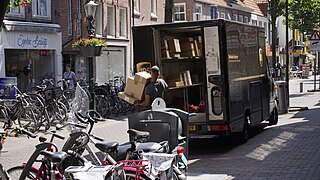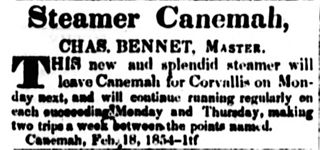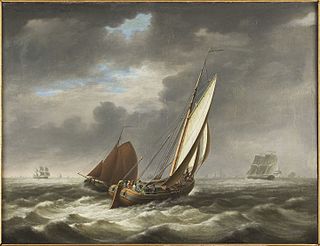
Cunard is a British shipping and cruise line based at Carnival House at Southampton, England, operated by Carnival UK and owned by Carnival Corporation & plc. Since 2011, Cunard and its three ships have been registered in Hamilton, Bermuda.

A steamboat is a boat that is propelled primarily by steam power, typically driving propellers or paddlewheels. Steamboats sometimes use the prefix designation SS, S.S. or S/S or PS ; however, these designations are most often used for steamships.

Package delivery or parcel delivery is the delivery of shipping containers, parcels, or high value mail as single shipments. The service is provided by most postal systems, express mail, private courier companies, and less than truckload shipping carriers.

The Union-Castle Line was a British shipping line that operated a fleet of passenger liners and cargo ships between Europe and Africa from 1900 to 1977. It was formed from the merger of the Union Line and Castle Shipping Line.

Parcel post is a postal service for mail that is too heavy for normal letter post. It is usually slower than letter post. The development of the parcel post is closely connected with the development of the railway network which enabled parcels to be carried in bulk, to a regular schedule and at economic prices. Today, many parcels also travel by road and international shipments may travel by sea or airmail.
The Collins Line was the common name for the American shipping company started by Israel Collins and then built up by his son Edward Knight Collins, formally called the New York and Liverpool United States Mail Steamship Company. Under Edward Collins' guidance, the company grew to be a serious competitor on the transatlantic routes to the British Cunard shipping company.

The Black Ball Line was a passenger line founded by a group of New York Quaker merchants headed by Jeremiah Thompson, and included Isaac Wright & Son (William), Francis Thompson and Benjamin Marshall. All were Quakers except Marshall.
The maritime history of the United States (1800–1899) saw an expansion of naval activity.

The Royal Mail Steam Packet Company was a British shipping company founded in London in 1839 by a Scot, James MacQueen. The line's motto was Per Mare Ubique. After a troubled start, it became the largest shipping group in the world in 1927 when it took over the White Star Line. The company was liquidated and its assets taken over by the newly formed Royal Mail Lines in 1932 after financial trouble and scandal; over the years RML declined to no more than the name of a service run by former rival Hamburg Süd.

The Post Office Packet Service dates to Tudor times and ran until 1823, when the Admiralty assumed control of the service. Originally, the Post Office used packet ships to carry mail packets to and from British embassies, colonies and outposts. The vessels generally also carried bullion, private goods and passengers. The ships were usually lightly armed and relied on speed for their security. However, Britain was at war almost continuously during the 18th and early 19th centuries with the result that packet ships did get involved in naval engagements with enemy warships and privateers, and were occasionally captured.

The Baltimore Steam Packet Company, nicknamed the Old Bay Line, was an American steamship line from 1840 to 1962 that provided overnight steamboat service on Chesapeake Bay, primarily between Baltimore, Maryland, and Norfolk, Virginia. Called a "packet" for the mail packets carried on government mail contracts, the term in the 19th century came to mean a steamer line operating on a regular, fixed daily schedule between two or more cities. When it closed in 1962 after 122 years of existence, it was the last surviving overnight steamship passenger service in the United States.

Packet boats were medium-sized boats designed for domestic mail, passenger, and freight transportation in European countries and in North American rivers and canals, some of them steam driven. They were used extensively during the 18th and 19th centuries and featured regularly scheduled service. Steam driven packets were used extensively in the United States in the 19th century on the Mississippi and Missouri rivers, supplying and bringing personnel to forts and trading posts.
South African Post Office is the national postal service of South Africa and as a state owned enterprise, its only shareholder is the South African government. In terms of South African law, the Post Office is the only entity that is legally allowed to accept reserved mail, and as such, it operates a monopoly. It employs over 16,480 people and operates more than 1,400 postal outlets throughout the country and therefore has a presence in almost every single town and city in South Africa. Nomkhita Mona joined the SA Post Office in April 2021 as group CEO. Its main subsidiary is Postbank, a financial services provider.

Canemah was one of the first steamboats to run on the Willamette River above Willamette Falls. Canemah was the first steamboat to load grain at Corvallis, the first to carry the mail on the Willamette River, and the first steamboat in Oregon to suffer a fatal boiler explosion.

A cargo liner, also known as a passenger-cargo ship or passenger-cargoman, is a type of merchant ship which carries general cargo and often passengers. They became common just after the middle of the 19th century, and eventually gave way to container ships and other more specialized carriers in the latter half of the 20th century.

SS (RMS) Douglas (III) – the third vessel in the line's history to bear the name – was a packet steamer which entered service with the London and South Western Railway in 1889 under the name Dora until she was purchased by the Isle of Man Steam Packet Company in 1901 for £13,500.

Beurtvaart was a Dutch line shipping system for (mostly) inland navigation, that existed from the late 15th century. It was a form of packet trade and a precursor of public transport. The beurtships transported passengers, livestock and freight along fixed routes at fixed prices. Departures were scheduled, with ships even sailing when not fully laden, and local authorities took legal measures to rule out the competition.

The General Steam Navigation Company (GSN), incorporated in 1824, was London's foremost short sea shipping line for almost 150 years. It was the oldest shipping company in the world to begin business with seagoing steam vessels.

The Carlisle Canal opened in 1823, to link Carlisle to the Solway Firth, to facilitate the transport of goods to and from the city. It was a short-lived venture, being replaced by a railway which used the canal bed for most of its route in 1854.

Mail boats or postal boats are a boat or ship used for the delivery of mail, and sometimes transportation of goods, people and vehicles, in communities where bodies of water commonly separate settlements, towns or cities, often where bridges are not available. They are also used where water transport is more efficient or cost effective, or other means of transport to the destination is impractical, even when roads or flights may be another option.

















